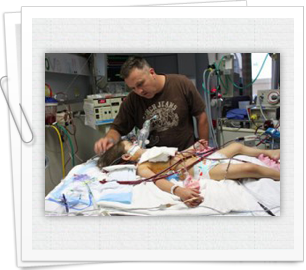Online CPR Certification Blog
Kids CPR
Date: September 18th, 2013
 It came to the knowledge of researchers that children who suffer in-hospital cardiac arrests are often deprived of some benefits when exposed to a much longer cardiopulmonary resuscitation period. The research took a study of 3,419 children to prove the matter. Of that population, 28% were able to survive until they were released from hospital. 16.6% of these patients who survived had been receiving the CPR for more than 35 minutes.
It came to the knowledge of researchers that children who suffer in-hospital cardiac arrests are often deprived of some benefits when exposed to a much longer cardiopulmonary resuscitation period. The research took a study of 3,419 children to prove the matter. Of that population, 28% were able to survive until they were released from hospital. 16.6% of these patients who survived had been receiving the CPR for more than 35 minutes.
In their study report, researchers said that 60% of the same number of survivors (having been through more duration in the CPR) had shown achievements in favorable neurological results. Patients who went through CPR for duration of 1 to 15 minutes had better neurological results of 44% as compared to those that went for 16 and 35 minutes of CPR who only achieved 17.8% survival rate.
The researchers were able to note that higher rate of favorable neurological outcomes was witnessed in those patients that survived and got release by the hospital. The researchers wrote that CPR in children that took more than 20 minutes in the mid-1990 was often unsuccessful. According to Matos and colleagues, from recent data, children survival after CPR is higher when the procedure is offered for longer period.
Though this result leaned on specific patients, in the current studies, an application of prospective collection of data has been adopted to counter the prior results limitations. The data is obtained from the American Heart Association’s registry know as Get with the Guidelines-Resuscitation (GWTG-R).
From the research, 3,149 children that were under the study came from 328 medical facilities in the U.S. and Canada from the beginning of the year 2000 until the end of 2009. It was established that even though the children going through longer CPR period benefited, the fact was that after 15minutes, the rate survival to discharge declined swiftly.
Causes and differences of a decline in children survival
According to the researchers, there was a 2.1% decline per minute of chest compressions over the 15 minutes. The same applied to neurological achievements, which dropped by 1.2% per minute of more time on performing chest compressions. Some medical conditions were seen to be associated with the resulted differences in survival rate. When a longer CPR of more than 35 minutes was performed to the children, the following ranked list of percentage of survival to discharge was obtained:
- Surgical Cardiac: 25%
- Medical Cardiac: 21%
- General Surgical: 13%
- General Medical: 10%
- Trauma: 8%
The same case was seen to apply also to the patients that had favorable neurological results. It was suggested by the researchers that a proportion of all those children that would otherwise have died, without having CPR being performed on them, survived with favorable neurological results.
Limitations of the study
According to the researchers, their results and facts could not be applied to hospitals outside the GWTG-R registry because the hospitals under this registry have more interest in CPR outcomes. The continued to say that their research could not be used on infants in the neonatal intensive care departments.
